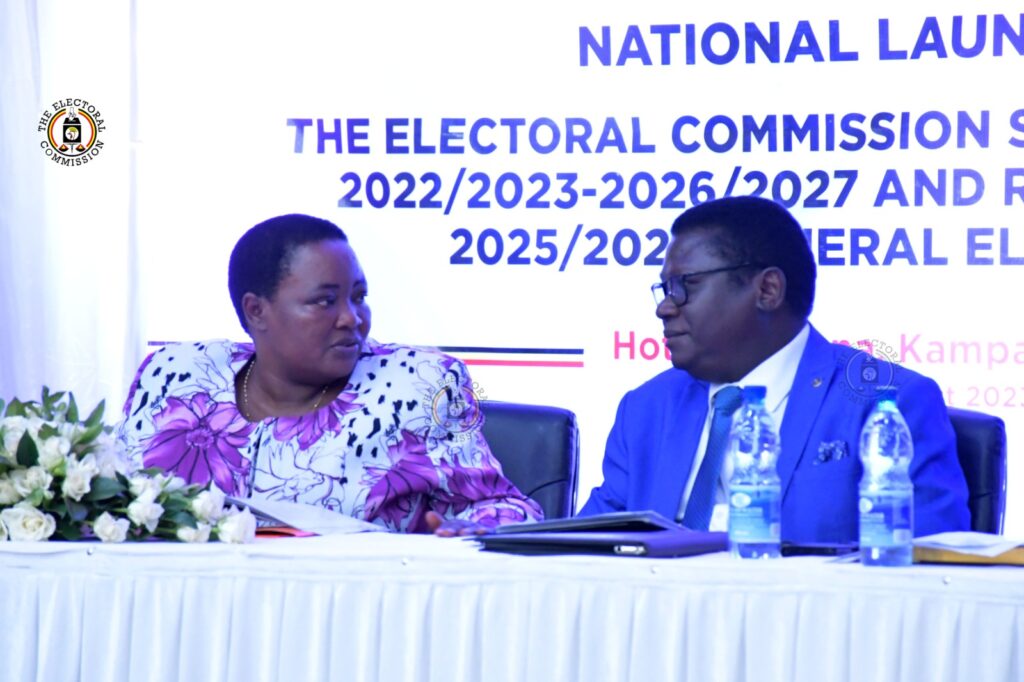By Frank Mugisha
The Commission has launched the roadmap for the 2026 general elections, as well as the strategic plan for 2022/2023-2026/2027. The roadmap launched by the Electoral Commission (EC) on 2nd August 2023 comes early enough for the commission, political party players and other stake holders like government to prepare well enough for a smooth, free and fair general elections 2026 suggesting an important step towards enhancing Uganda’s electoral process.
The EC Chairperson, Justice Byabakama Mugenyi Simon used the launch ceremony in Kampala at Hotel African and appealed to the Government to consider and approve the creation of new administrative units in a timely manner, so that the electoral program and budget are not destabilized.
He (Byabakama) also cautioned political parties and organizations not to misuse the early release of these plans as a selfish means to start engaging in a frenzy of campaign-related activities in the country. He noted that campaigns must follow a program approved and regulated by the commission, and
towards enhancing Uganda’s electoral process.
The EC Chairperson, Justice Byabakama Mugenyi Simon used the launch ceremony in Kampala at Hotel African and appealed to the Government to consider and approve the creation of new administrative units in a timely manner, so that the electoral program and budget are not destabilized.
He (Byabakama) also cautioned political parties and organizations not to misuse the early release of these plans as a selfish means to start engaging in a frenzy of campaign-related activities in the country.
He noted that campaigns must follow a program approved and regulated by the commission, and urged parties to pursue peaceful co-existence before, during, and after the electoral process.
The Chairperson, explained that the objective of these plans is to improve operational efficiency, stakeholder awareness, and participation, building upon the positive reforms and innovations from the last general elections
Additionally, the plans aim to enhance organizational and staff capacity planning.
The launched plans are an emphasis from the results of the previous EC’s extensive research and stakeholder consultations that were country-wide.
They conducted post-election evaluation workshops across the country following the 2020/2021 general election, where various stakeholders provided their honest assessments about the electoral process and its conduct.
Byabakama also articulated and sent gratitude towards the people of Uganda for the support they exhibited during the 2020/2021 general election, which took place amidst the challenges of the Corona Virus pandemic.
The objectives of the strategic plan include enhancing citizen participation, strengthening stakeholder collaboration and engagement, delivering free and fair elections and referenda, improving information sharing, public trust, and confidence in the electoral process, and strengthening the capacity of the Electoral Commission.
The plan also includes specific goals, activities, budget estimates, and time frames to guide the preparations for the 2025/2026 General Elections.
To ensure a smooth election process, Byabakama stressed the need for timely amendment/enactment of electoral laws by the government and approval for the creation of new administrative units.
He thanked the government and development partners for funding the Electoral Commission and urged the government to continue providing adequate funding in a timely manner.
These plans are focused on improving operational efficiency, stakeholder awareness, and participation to ensure a smooth democratic process.
“It is now crucial for all stakeholders to start planning and working towards the goals outlined in the roadmap” Justice Byabakama noted.
The Rt. Hon. Prime Minister, Robinah Nabbanja who graced the launch as guest of honor in the company of Minister Justice and constitutional affairs Norbert Mao expressed that her office or the office of the Prime Minister will make sure that the enactment of relevant laws for the 2025/2026 General Elections is done before the end of 2023/2024 financial year.

She also stressed government’s commitment to supporting the strategic plan and roadmap 2026.
Line Ministry and Minister Norbert Mao noted the concerns of EC lamenting about civic education. “I would want us to focus on civic education. The citizens are the nursery beds for leaders because leaders are picked from citizens. We need to make sure our citizens have civic education” Mao, the Minister of Justice and Constitutional Affairs.
“The issues raised such as the need to enact laws to enable the elections are very vital. These are issues that keep Ugandans waiting.” Mao added.
According to EC Secretary, Leonard Mulekwah, the commission gave an extensive plan and roadmap highlighting registering of voters and voter registers display, nomination of candidates and demarcation of electoral areas.
According to the Presidential Elections Act, nominations for President are expected to take place between 2nd October and 3rd October 2025 and demarcation of the electoral areas should be done by July 2024.
The EC is this time expected to spend a wholesome budget allocation of colossal budget of 1.3 trillion Uganda shillings compared to the previous budget allocations of the same exercise but financing will also be dependent on the allocation from government.
EC will need a budget allocation of 1,387,821trillion Uganda shilling as the total cost of the roadmap and strategic plan.
The MTEF to the electoral commission allocation over the five years’ strategic plan which includes three-year roadmap cost for 20225/26 general elections.
The allocated ugx566.20Bn out of the commission budget estimate of ugx2, 541, 409 Bn, that is 22.28%, is not adequate to fund the general elections roadmap which is projected to cost ugx1.387, 821 trillion.
According to findings, the major cost drivers for the projected elections include the increasing cost of conduction elections largely due to continuous improvement and/or reforms in the electoral processes, increase in the number of constituencies and administrative units, increase in the voting population, increase in the number of elective positions, increase in the number of nominated candidates, adoption of ICTs, increase in the number and pay of adhoc staff, number of polling stations, costs of observing standard operation procedures for the prevention of covid 19 price changes and exchange rates.
